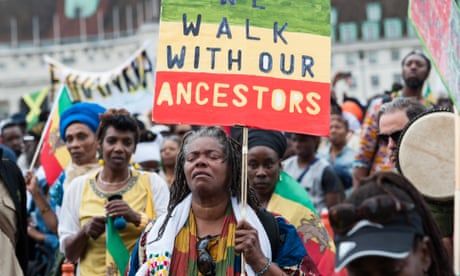
The call for justice is not going away. Rather than ignore it, Labour should be entering the conversation – and shaping it
You could be mistaken for thinking that reparations are some wacky idea that have never been tried before. Listening to the debate about them in Britain, it’s almost as if the Caribbean nations of the Commonwealth are asking for something unprecedented, their mere suggestion prompting bile and bluster on breakfast news shows. Kemi Badenoch, prospective leader of the Conservative party, described the argument for reparations as a “scam”, and urged people not to “fall for it”. Writing in the Daily Mail, her rival Robert Jenrick suggested Britain’s former colonies ought to be thankful for the legacy of empire rather than demanding reparations. “Where does it end?” Nigel Farage recently cried on GB News. “We cannot concede anything. The past is the past … There are many other countries in the world that have done far worse.” Perhaps, Farage suggested, Britain should call for reparations against the French.
For all the incredulity that Badenoch and Farage show whenever they hear the R-word, reparations are increasingly a fairly standard part of international human rights law, the transitional justice version of those “Have you suffered an injury that wasn’t your fault?” ads on daytime TV. They have been used numerous times, such as when the German government recognised the genocide against the Herero and Nama ethnic groups and committed to pay their descendants in Namibia $1.3bn (£930m), or when the Canadian federal government signed the Indian Residential Schools Settlement Agreement, agreeing to provide $2bn of reparations to survivors. There are UN guidelines that outline when a violation of international human rights law can give rise to a right to reparation, and there have been a number of legal cases where reparations have been recognised and quantified by judges.
Continue reading...